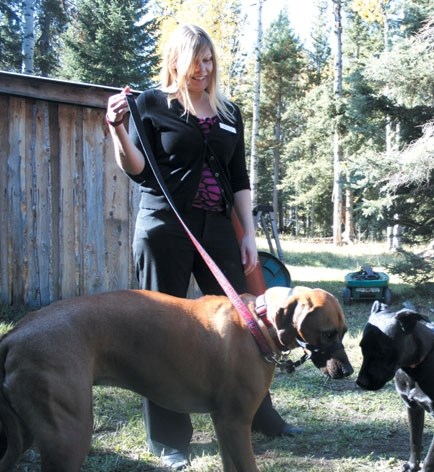The numbers of feral, forgotten dogs that roam First Nations communities across North America are perhaps in the millions.
Impassioned by years of caring for these unwanted creatures through her clinic, Banded Peak Vet Clinic in Bragg Creek, veterinarian Judith Samson-French calls these canines ‘Dogs With No Names’ (DWNN) and with the help of some dedicated volunteers, is hoping to change the future of these DWNN through science — a pilot project that implants feral and semi-feral dogs with a contraception that lasts 16-18 months, under the auspices of Samson-French’s non-profit organization, Dogs With No Names.
The vet said in three years, the project has led to the prevented births of thousands of unwanted pups.
“We started a pilot project in 2009 with a life span of three years and 115 implants, which we did,” explained Samson-French.
“Since we have seen very positive results — conferring sterility, catching dogs and support from First Nations — we are moving forward with another 80 implants.”
Samson-French held a fundraiser on Sept. 29 at her clinic to raise funds for the implants, de-wormers, microchips and food required by the project; the event raised more than $8,000.
A common question that comes to mind for anyone not familiar with the procedure is, of course, why this over standard neutering or spaying?
Samson-French said it’s because this procedure, which takes less than one minute to insert under the skin of feral female dogs is more cost effective (about $50 per dog), less invasive and is simply a better fit for dogs that must be handled much like a coyote or wolf.
The product, Suprelorin (deslorelin) is a contraception that temporarily suppresses the reproductive endocrine system and is produced by a company in Australia called Peptec.
“Dogs with no names are fearful of people and to spay them means catching them, handling them, putting them into crates, keeping them indoors for 1-2 days . . . also, spaying means shaving the abdomen which is fatal for these dogs in cold weather since they do not have a home to go too for weeks after surgery, thus spaying could occur only in the summer months.”
On the downside, the procedure only lasts 16 to 18 months — although feral dogs have a significantly shorter life expectancy than domesticated dogs, estimated at only three years on average, so most dogs would not require more than two procedures.
“It may only last 14 to 16 months, but with the microchip technology we can easily go back and do another implant at the request of the owner,” explained Mona Jorgensen, project partner.
The areas where Samson-French, Jorgensen and their volunteers are performing the procedure include the First Nations communities of Tsuu T’ina and Siksika; to date, the team has not worked with feral dogs in Morley, commending the Cochrane and Area Humane Society (CAHS) for their efforts to spay and neuter in the nearby community; also, as permission is needed from community members, this is more difficult when going door-to-door in Morley, as the houses are much farther apart in the three-band community than other First Nations sites.
“Anything that positively impacts the pet overpopulation problem is a great help — there are just too many dogs on First Nations communities,” said CAHS spokesperson, Cheryl Wallach; the CAHS recently received a grant from Pet Smart Charities Canada to supplement some 200 spay and neuter surgeries for owned pets in Morley.
By the spring of 2013, Samson-French and Jorgensen aim to have conducted another 80 procedures.
The initiative is completely volunteer-run; the costs for the program are paid for by the Banded Peak Vet Clinic, Samson-French’s jewelry line, Lotus Lines, which she co-owns with her husband, hard-working volunteers and private donations.
Lotus Lines has formed an association with Pet Planet pet food stores to donate food based on the sales of pearl earrings; to date, some 2,000 pounds of dog food has been raised to feed the rescued feral dogs.
Calgary dog rescue society, the Animal Rescue Foundation (ARF) has also assisted Dogs With No Names.
Famed chocolatier and Bragg Creek resident, Bernard Callebaut or Papa Chocolat, also provides one kilogram of dog food for every box of chocolates with a paw print sold.
Samson-French said she has applied for government help on both provincial and federal levels and has been turned down.
“My primary motive comes from this: a dog that has a name and a home gets food and medical attention when it is suffering. The DWNN are without homes through no fault of their own and when in pain, no one cares for them as they are not owned...These dogs are dropped off at my clinic and no one cares for them — how can we not?”
Samson-French is also on the brink of launching a book on the subject which lies close to her heart, Dogs With No Names: in pursuit of courage, hope and purpose. One hundred per cent of the proceeds from the book will go toward Dogs With No Names; the book will be released Nov. 1, 2012. Samson-French and her team hope to continue to build more partnerships with area humane societies and are hoping to replicate this project in other northern communities — even as far as the Arctic; visit dogswithnonames.ca for more info.




